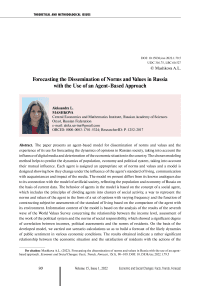Forecasting the dissemination of norms and values in Russia with the use of an agent-based approach
Автор: Mashkova Aleksandra L.
Журнал: Economic and Social Changes: Facts, Trends, Forecast @volnc-esc-en
Рубрика: Theoretical and methodological issues
Статья в выпуске: 1 т.15, 2022 года.
Бесплатный доступ
The paper presents an agent-based model for dissemination of norms and values and the experience of its use for forecasting the dynamics of opinions in Russian society, taking into account the influence of digital media and deterioration of the economic situation in the country. The chosen modeling method helps to predict the dynamics of population, economy and political system, taking into account their mutual influence. Each agent is assigned an appropriate set of norms and values and a model is designed showing how they change under the influence of the agent’s standard of living, communication with acquaintances and impact of the media. The model we present differs from its known analogues due to its connection with the model of artificial society, reflecting the population and economy of Russia on the basis of current data. The behavior of agents in the model is based on the concept of a social agent, which includes the principles of dividing agents into clusters of social activity, a way to represent the norms and values of the agent in the form of a set of options with varying frequency and the function of constructing subjective assessments of the standard of living based on the comparison of the agent with its environment. Information content of the model is based on the analysis of the results of the seventh wave of the World Values Survey concerning the relationship between the income level, assessment of the work of the political system and the norms of social responsibility, which showed a significant degree of correlation between incomes, political assessments and the norms of residents. On the basis of the developed model, we carried out scenario calculations so as to build a forecast of the likely dynamics of public sentiment in various economic conditions. The results obtained indicate a rather significant relationship between the economic situation and the satisfaction of residents with the actions of the government. In the developed model, the change in a person’s beliefs is limited to their inner world; therefore, implementing new aspirations in attempts to change one’s own life or society is an important direction for future research.
Agent-based model, norms and values, standard of living, digital media, world values survey
Короткий адрес: https://sciup.org/147237319
IDR: 147237319 | УДК: 316.75
Текст научной статьи Forecasting the dissemination of norms and values in Russia with the use of an agent-based approach
The research subject in the article is the dissemination of norms and values, where values mean what is important for a person in life: love, wealth, sense of security (Poel, Royakkers, 2011), and norms denote behavior standards in society (Fishbein, Azjen, 2011; Mercuur et al., 2019). The dynamics of person’s norms and values depends on both the events of their life related to family, education, work, and the influence channel to which they are exposed by acquaintances and the media. In the previous decade, Internet platforms such as YouTube, Twitter, TikTok, aimed at various age and social groups, have taken a leading place among the media. With their help, everyone gets the opportunity to publish their opinions and judgments, which significantly changes the ways of the dissemination of norms and values (Chen, Lan, 2021). Influencers’ impact in social networks can be potentially negative, provoke discontent with the current government in order to further destabilize the political situation.
The analysis of the influence channel from the media on norms and values is becoming an increasingly urgent task which is associated with both an increase in the time spent in the digital space (transition of work and entertainment to an online format under the imposed restrictions), and with a decrease in the standard of living and growth in the susceptibility of the most affected categories to the propagandized attitudes. The solution of this problem requires creating special tools that allow taking into account the contribution of a large number of factors including the interest level in socio-political issues and access frequency to the media among different age groups, influence degree of attitudes, promoted by influencers on subscribers’ opinion, the importance of economic factors and government actions to change residents’ views.
Observation of opinions and moods in society is an important part of sociological and political science research in Russia and abroad. To obtain up-to-date assessments of public opinion, surveys and monitoring are conducted with varying extent of respondents’ coverage. At the regional level, Vologda Research Center of RAS carries out regular monitoring. Its results allow considering the dynamics of both assessments of the current government and the economic situation of Vologda Oblast residents1. Russia’s population is studied within the framework of the longitudinal household survey of the RLMS-HSE2, VCIOM surveys3, monitoring of the Institute of Sociology of RAS4. The World Values Survey covers almost 100 countries including Russia5; its results are published in a detailed form which helps to compare respondents’ opinions with their gender, age, income and therefore identify factors influencing the formation of views of various social groups.
The data of polls and public opinion monitoring form the basis of analytical studies of the dissemination of norms and values. For example, N.I. Lapin’s work suggests an approach to clustering the values of residents of Russian regions, based on the all-Russian monitoring results (Lapin, 2010). S.V. Mareeva analyzes the Russians’ value dynamics according to the data of various monitoring waves of the Institute of Sociology of RAS and the World Values Survey (Mareeva, 2013; Mareeva, 2015). Publications of the previous two years pays special attention to the impact of the COVID-19 pandemic on the moods and values of the population, in particular, an increase in the role of digital media (Davydov, 2021) and change in the attitude to power in a crisis (Waigeng et al., 2021; Iliycheva et al., 2021).
The above papers analyze the dynamics and structure of the population’s values, based on retrospective data, but forecasting their changes in the future is beyond the scope of research.
The complexity of the task, set in our work, makes it necessary to turn to modern modeling methods that allow predicting the dynamics of the population, economy and political system taking into account their mutual influence. The most suitable method for this purpose is agentbased modeling, which reproduces behavior and interaction of autonomous agents representing individuals in society. Russian groups of authors used this method to predict the development of municipalities (Makarov, Bakhtizin, 2013), dynamics of economic system (Suslov et al., 2016) and social policy (Novikova, Tsyplakov, 2020).
In foreign studies, a well-developed direction is the creation of agent- based models of opinion dynamics. Depending on the way opinions are presented, there are two main classes of models: discrete opinions and continuous opinions. The first class of models is most often used to predict public voting results (Stauffer, 2002; Sznajd-Weron,
Sznajd, 2000). Its feature is the tendency to form consensus; thus, the models are not suitable for modeling social processes with a high degree of opinion polarization (Adams et al., 2021).
For this reason, models that represent opinions as continuous values, such as support level for a candidate or a legislative decision, have become more widespread. The most famous of them is the bounded confidence model (Deffuant et al., 2000; Hegselmann, Krause, 2002; Weisbuch et al., 2002). Opinions in this model are characterized by a degree of similarity; agents interact with each other only if their opinions are sufficiently similar. Consensus in the second class models is possible if opinions have a significant degree of similarity, otherwise there is opinion polarization due to the agents’ influence with radical initial views (Chen, Lan, 2021).
The two approaches are combined within the framework of the model of continuous opinions and discrete actions (CODA model) (Martins, 2013). The agents’ opinions in it can be neutral or change up to radical, which allows reflecting a significant polarization degree in society. In CODA models, consensus is rarely achieved, only if the network of relationships is defined by a fully connected graph, and thus, each pair of agents interacts (Ceragioli, Frasca, 2018). Based on CODA approach, a number of opinion dynamics models have been developed (Ceragioli, Frasca, 2018; Jiao, Li, 2021; Zino et al., 2020). Opinions are formed under the influence of communication channel, and communication is conducted either without a specific purpose (passively) (Ceragioli, Frasca, 2018), or an active approach to interaction is implemented; it means that the agents communicate only with those agents in whom they expect to find allies (Jiao, Li, 2021). In the model described in (Zino et al., 2020), along with communication channel, the influence channel is considered, which allows investigating complex phenomena such as paradigm shifts in society.
The influence of the digital media on the dissemination of norms and opinions is considered in (Hu, Zhu, 2017; Pineda, Buendfa, 2015; Zhang et al., 2018). The tasks of this research area include the study of the comparative contribution of the media, social networks and personal interaction to the public opinion dynamics and the possibility of reaching consensus. The influence of the agents’ character and their “credulity” is also taken into account, for this purpose “stubborn” agents are created that are not subject to external influence (Hu, Zhu, 2017); agents are endowed with different confidence levels in their opinion (Pineda, Buendfa, 2015), agents have a choice: accept, reject or partially consider the messages they receive (Quattrociocchi et al., 2011). The research purpose (Dong et al., 2017) is to study the conditions for achieving consensus and the contribution of online interactions of agents to this process. Experiments, conducted on the basis of the developed onlineoffline model, have shown that under the influence of interactions on the Internet, the agents’ opinions can smoothly change, as a result of which the number of opinion clusters decreases.
The influence of norms and values on the agents’ behavior is considered in (Mercuur et al., 2019; Atkinson, Bench-Capon, 2016; Cranefield et al., 2017), moreover (Atkinson, Bench-Capon, 2016; Cranefield et al., 2017) focuses on the creation of agents capable of making decisions, based on their norms and values, and the study (Mercuur et al., 2019) is aimed at comparing empirical data on human behavior with the results of modeling the agents’ actions with norms and values.
The purpose of our research is to develop an agent-based model of the dissemination of norms and values and use this model to obtain forecasts of the view dynamics in Russian society taking into account the influence of digital media and the dynamics of the economic situation in the country. The tasks are:
– to present the concept of a social agent with a set of norms and values, able to exchange information with other agents and perceive external influences including messages from the media;
– to develop the structure and algorithms of an agent-based model of the dynamics of the dissemination of norms and values;
– to prepare initial modeling data from available official sources and sociological research;
– to carry out scenario calculations, based on the developed model, aimed at predicting the dynamics of norms and values in various economic conditions.
The scientific novelty of the research is primarily associated with working out an agent-based model that adapts modern approaches to modeling the dissemination of norms and opinions to modern Russian society that allows reflecting the current demographic and socio-economic situation and establishing the relationship between public sentiment and influence channel from various sources. The model combines the features of CODA models and the bounded confidence models; in particular, the principle of setting norms and values of agents by discrete options with variable frequency, as in CODA models, is used. The similarity with the bounded confidence models lies in the fact that for different options of the same norm, the degree of their difference is determined, and communication occurs between agents whose options are not diametrically opposed. An important difference between the presented model and known analogues is its connection with the artificial society model (Mashkova et al., 2020) reflecting the population and Russia’s economy on the basis of up-to-date information.
Research methods
The choice of an agent-based approach for predicting the dissemination of norms and values allows working out a model, centered on the resident and their relationships with the environment (Fig. 1). The agent’s environment is designed as an artificial society including the economy, educational and budgetary system, as well as mass media and tools for their regulation. The methodology of modeling the dissemination of norms and values, used in the study, includes the following stages:
-
1. Reproduction of an artificial society structure. At this stage, the regions’ population is recreated, organizations, workplaces, administrative institutions and educational system structure are created, and the initial distribution of opinions in society is set. To do this, large arrays of open data are collected from various sources, they are checked for consistency, brought to the required form for loading into the model; the source objects of the model are created and stored in the database.
-
2. Development of basic dynamic functions. The modeling of demographic processes,
-
3. Scenario modeling. The purpose of this stage is to conduct a series of scenario calculations in various economic conditions to obtain forecasts of the dynamics of norms and values in society.
production and consumption of products, organizations’ investment, the work of educational and budgetary systems, contacts between agents and the influence of the media is carried out.
Let us consider in detail the components of the developed model.
At the first stage, agents are created in accordance with gender-age structure; families living in the same household are formed. The population dynamics (at the second stage) is reproduced using the functions of growing up, birth, death, marriage and divorce.
Figure 1. Structure of the agent-based model of the dissemination of norms and values
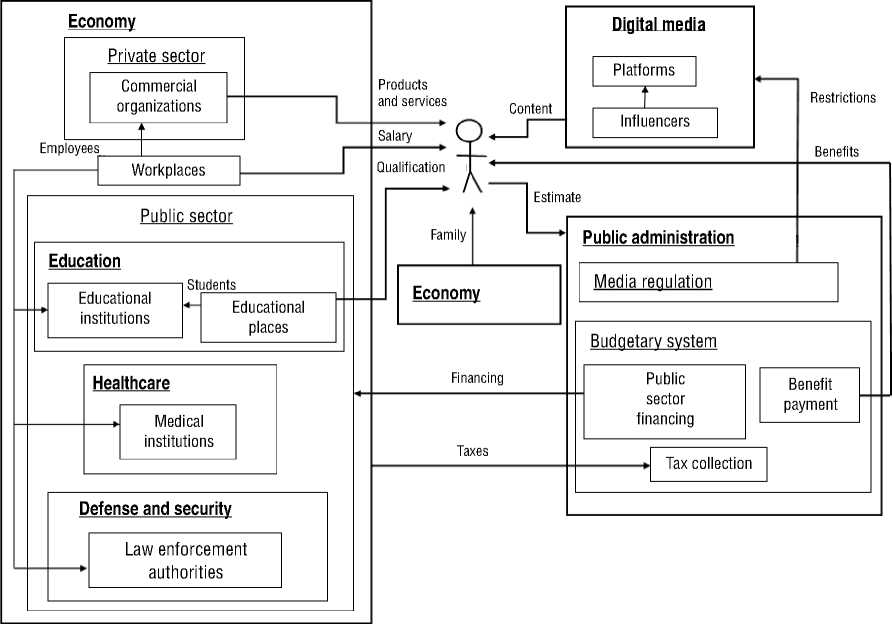
Source: own compilations.
Households have a common budget, which combines the income and expenses of all their members. If a household has a loan, first of all, payment is made on it, the remaining part of the budget is distributed between consumption and accumulation depending on the household’s consumption rate. A household purchases final products from a sale agent in its region for a calculated amount, the remaining money is added to the amount of its financial investments. In more detail, the work (Mashkova et al., 2019) considers the modeling of consumption processes in an artificial society.
In the economic system of the model of the dissemination norms and values, the private sector and the public sector are distinguished. The private sector is represented by commercial organizations that sell products and services to the public andto each other. The public sector includes budgetary organizations in the fields of education, healthcare, management, defense and security. Both commercial and budgetary organizations create jobs, occupied by residentagents. The work brings income to residentagents, and also forms a social circle to exchange opinions among colleagues.
The educational system in the model is part of the public sector and performs the function of improving the professional qualifications of resident-agents. There are three stages in the educational system of the artificial society model: school, secondary and higher vocational education. During the training, resident-agents make acquaintances with fellow students which can be preserved in the form of friendly relationships throughout life.
Among the functions of public administration in the model of the dissemination of norms and values, the regulation of mass media and the implementation of the functions of the budget system are highlighted. The budgetary system includes revenue (tax collection) and expenditure (financing of public sector organizations, payment of pensions and benefits) parts and is divided into the federal budget, regional budgets and extrabudgetary funds (Mashkova et al., 2020). The regulation of the digital media content is aimed at filtering potentially dangerous content of influencers on various platforms.
The mass media in the model distribute information content available to resident-agents on various platforms, in particular the Internet. To access the content, resident-agents subscribe to influencers and get access to the opinions they broadcast.
The agent architecture in the model includes four groups of characteristics. They are:
-
1. Biological: gender and age changing under the influence of demographic processes.
-
2. Socio-economic: education level, specialty, income, formed by the agent’s interaction with the educational and economic system.
-
3. Social: contacts with family, friends and colleagues, and following the influencers.
-
4. Mental: social activity cluster; subjective assessments and norms that are transformed under the influence of contacts with the environment, the media and changes in standard of living.
The introduced concept of “social activity cluster” is associated with the need to take into account the different propensity of agents to compare with others and their exposure to the effect of environment. Taking into account these characteristics forms the basis for grouping agents into social activity clusters, by analogy with consumers’ clusters in the diffusion of innovations (Rogers, 2003). The model of the dissemination of norms and values distinguishes four agents’ social activity clusters:
-
– Foxes are professional participants of sociopolitical processes (in the context of the model – influencers in social networks);
-
– Wolves are social media users with high interest in discussing socio-political issues and high exposure to influence;
– Dogs are social media users with moderate exposure to influence;
– Rabbits are a neutral-minded part that is involved in socio-political processes only in critical situations when their income becomes extremely low ( ELS = 0).
Table 1 presents the main characteristics of social activity clusters.
The comparison sample defines the group with which the agent compares themselves when assessing their standard of living. Depending on the agent’s cluster, the comparison samples for them can be the richest people in the country, region or among acquaintances, or the average income of all acquaintances (for the cluster Rabbits ).
Each agent is assigned an appropriate set of norms and values, and the model designed their changes under the influence of the agent’s standard of living, their communication with acquaintances and messages from the media. To set norms and values, the model uses the principle of discrete options (variants) that determine the agent’s possible views in a certain area. The options are characterized by a frequency that changes under the influence of external actions, as is customary in CODA-type models. The value of a certain agent’s norm at a concrete point in time is considered to be the option with the highest frequency. This paper examines three assessments and norms, related to the socio-economic situation in the country:
-
1. A discrete norm of social responsibility, its options are: “The government should be responsible for providing the population with everything necessary”, “People should take responsibility for
-
2. A discrete assessment of the work of the political system, its options are: “Rather satisfied”, “Completely dissatisfied” and an intermediate option “Something in between”.
-
3. Subjective assessment of the standard of living of ELS (estimate of the living standard). It is in the range from 0 to 1, where 0 corresponds to an extremely low standard of living, and 1 is quite satisfactory according to the agent. ELS is calculated using the fuzzy logic function; the parameters are the agent’s income, living wage in the region and comparison income:
providing themselves with everything necessary” and an intermediate option “Something in between”.
Г 0, AI < lwr
ELS = L^1-^, lwr < AI < CI, (1)
CI-lwT , ,
I 1, AI>CI where ELS – subjective estimate of the living standard; AL – agent’s income; CL – comparison income; lw r – living wage in the region r.
Since the ELS estimate is fuzzy, it allows comparing the estimates, obtained for different agents in a normalized range, which is especially convenient when comparing residents’ incomes in different regions.
In discrete norms and estimates, the degree of similarity of options is set, communication occurs between agents whose options are not diametrically opposed. This principle is used in the bounded confidence models and makes it possible to reach consensus in society if it has a sufficient number of agents with “intermediate” options.
Table 1. Social activity clusters in the model
|
Cluster representative |
Role in the model |
Comparison sample |
Exposure to influence |
|
Fox |
Influencer |
The 10 richest people in the country |
Low |
|
Wolf |
Follower |
The 10 richest people in the region |
High |
|
Dog |
Follower |
The 10 richest acquaintance |
Average |
|
Rabbit |
Neutral/follower |
All acquaintance |
Low |
|
Source: own compilations. |
|||
The frequency of options of norms changes over the course of the model time under the environmental impact, influence channel of the media and the standard of living. A change in the frequency of options entails a change in the norm if some option has gained a higher frequency than the option that determined the norm in the previous time period. The unit of model time is one clock cycle corresponding to one month of real time, that is, the revision of the frequency of norms is carried out 12 times a year.
To exchange the views of resident-agents, a network of contacts is created in the model connecting family members, colleagues and fellow students (Fig. 2). Contacts are formed at the stage of creating the socio-economic environment of the model (Mashkova et al., 2020) and are divided into family, work and friends.
In general, if an agent lives with their family, studies and works at the same time, it forms contacts of all kinds. In particular cases, an agent may have one or two types of contacts, at least contacts with friends who are selected from resident-agents of similar age, with a maximum age difference of 5 years.
Figure 2. Algorithm for forming contacts’ network in the model
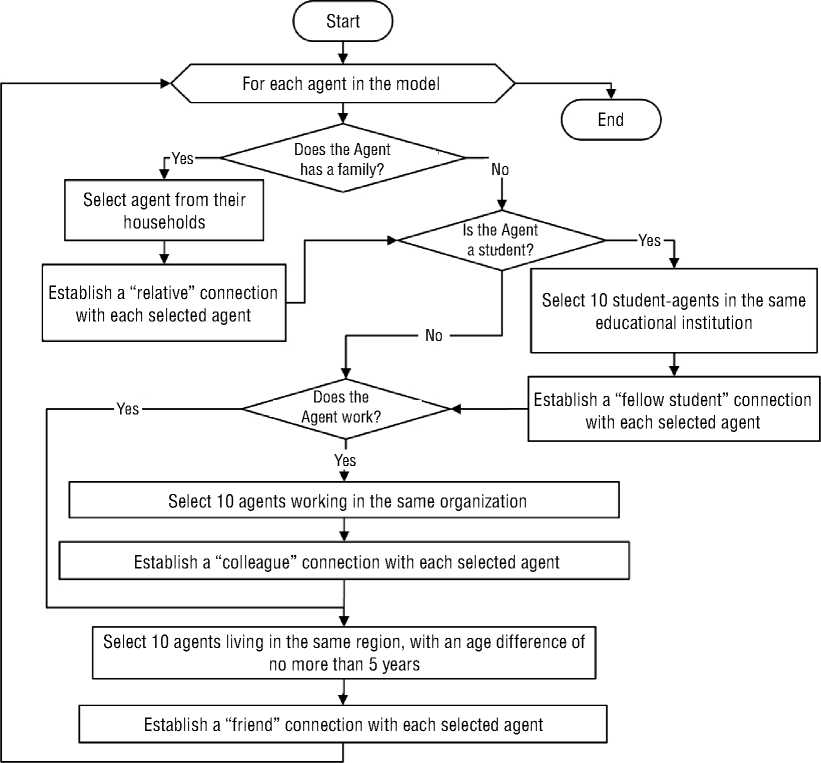
Source: own compilations.
Figure 3 shows an algorithm for calculating estimates of the agents’ standard of living, within which agents’ selection, included in the sample, is formed to compare purposes for different clusters, the calculation of their average income CI and the actual ELS estimates.
The agent’s norms and values in the model change within the framework of three procedures:
-
1) revision of the agent’s views due to an economic change;
-
2) the impact of influencer-agents on digital media users;
-
3) the agent’s communication with family, friends and colleagues
The first procedure reflects the correlation between the agent’s standard of living and its views
Figure 3. Algorithm for calculating ELS score
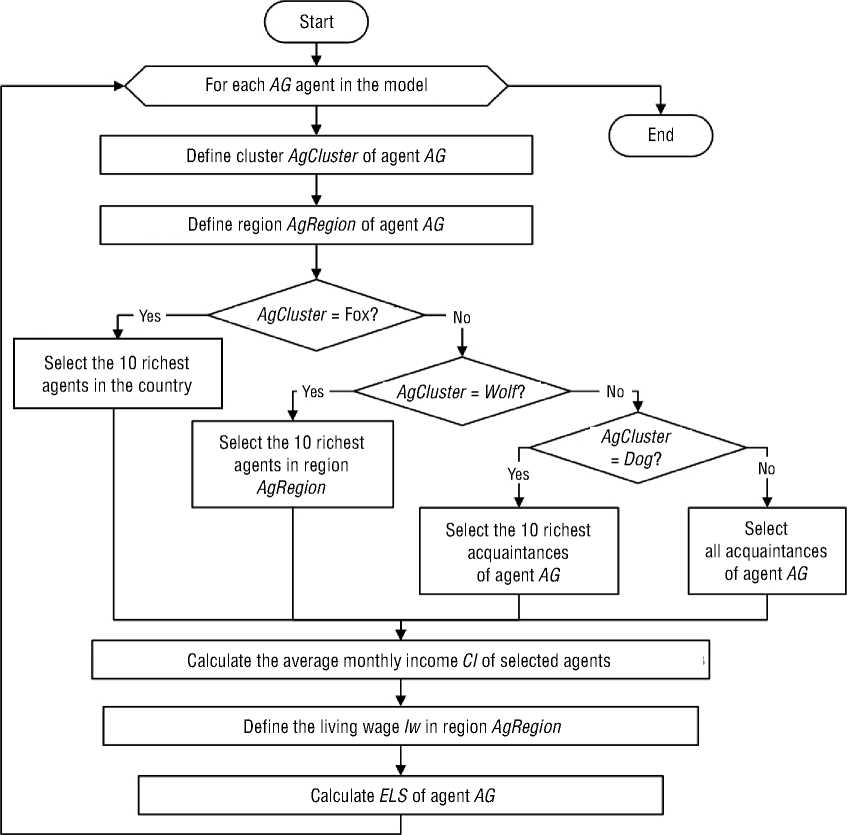
Source: own compilations.
on the effectiveness of government actions and their responsibility to provide population with everything necessary. The empirical data confirms this dependence, as will be shown in the relevant section, and therefore should be reflected in the model of the dissemination of norms and values. In the model, the assessment of the standard of living will have the strongest influence on the agents of the Rabbits cluster transferring them from a neutral to an active social state with declining standard of living. Figure 4 shows the corresponding algorithm for changing the agents’ norms.
Depending on the current value of the assessment of the agent’s standard of living, the frequency of the corresponding options of its political norms increases. With a high standard of living, the frequency of the options “People should take responsibility for providing themselves with everything necessary” increases for the norm of social responsibility and “Rather satisfied” to evaluate the work of the political system. With declining standard of living, on the contrary, the frequency of options increases: “The government should be responsible for providing population with everything necessary” for the norm of social responsibility and “Completely dissatisfied” for evaluating the work of the political system. The quantitative parameter of the change in the frequency of options is selected in such a way that when the standard of living changes, a change in views can occur in one year.
In the procedure of influence channel, the agent increases the frequency of the option, promoted by the influencer, which it follows. The rate of change of an agent’s beliefs depends on its susceptibility to persuasion.
Figure 4. Algorithm for changing agents’ beliefs due to their economic situation
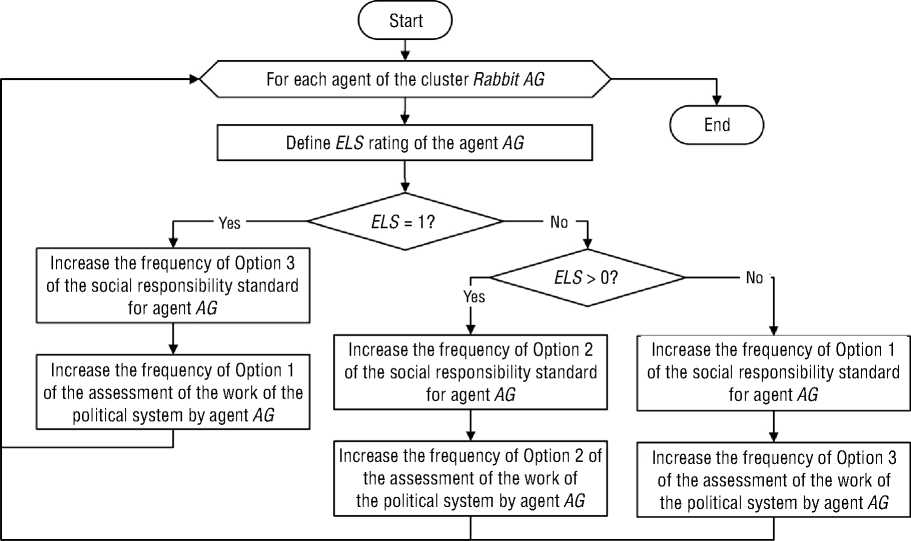
Source: own compilations.
-
Figure 5. Model program structure
User
Initial data
Creating population and economy
Scenarios
Calculation results
Origin objects

Source: own compilations.
When interacting familiar agents with each other, the beliefs of a younger cluster agent change, and remain unchanged if the agents belong to the same cluster.
The agent-oriented model of the dissemination of norms and values is programmatically implemented in Microsoft Visual Studio using the C# programming language. To store model objects and the results of scenario calculations, a model database was created using the PostgreSQL DBMS. Figure 5 presents the model program structure. The model operates in two modes: creating information objects of the model and modeling the dynamics of the dissemination of norms and values.
Within the framework of creating information objects of the model, an artificial society is formed in which the regional and gender-age structure of the Russian population is reproduced, families and households are formed; organizations of various industries are created, their output, supplies and the status of accounts are established; jobs are created and associated with agents of appropriate qualifications; the educational system is initialized, agents of the appropriate age are fixed for educational places in institutions of secondary and vocational education. In more detail, the issues of creating an artificial society reflecting the population and Russia’s economy are discussed in
(Mashkova et al., 2020). In the created artificial society, contacts are established between agents (see the algorithm in Fig. 2); estimates of the standard of living for agents over the age of 14 are calculated (see the algorithm in Fig. 3); the initial values of norms and values are set in accordance with the data in Table 3. The created objects and relationships are stored in the model database.
In the mode of modeling the dynamics of the dissemination of norms and values, the original objects are changed by implementing procedures for reviewing the agent’s views (see the algorithm in Fig. 4), the influencer-agents’ impact on the users of digital media and the agent’s communication with family, friends and colleagues in the context of the dynamics of the socio-economic environment set by the parameters of scenarios. The scenario calculation results are stored in the model database.
Initial simulation data
We have downloaded the initial data from the official portals of the Federal State Statistics Service6, the Ministry of Science and Higher Education of the Russian Federation7, the Unified
Table 2. Initial simulation data
|
Modeling object |
Variable |
Description |
|
Population |
м ? |
Number of men in region r in age group a |
|
Fra |
Number of women in region r in age group a |
|
|
H |
Number of households in region r |
|
|
Ст |
Number of married couples in region r |
|
|
Production |
V A y |
Added value of industry s in region r |
|
X t, |
Intersectoral deliveries |
|
|
Exps |
Product export of industry s |
|
|
Imp5 |
Product import of industry s |
|
|
Employment |
E5 |
Number of employees in region r and industry s |
|
AS5 |
Average salary in region r and industry s |
|
|
Finance |
0Ц. |
Organizations’ loans of industry s in region r |
|
OD5 |
Organizations; deposits of industry s in region r |
|
|
RLr |
Residents’ loans in region r |
|
|
RDr |
Residents’ deposits in region r |
|
|
Educational system |
S_SecsTp |
Number of students of secondary vocational education in specialty sp in region r |
|
S_High^.p |
Number of students of higher vocational education in specialty sp in region r |
|
|
Budgetary system |
Tax t |
Tax/excise rate of type t by industry s (if tax/excise has the same rate for all industries, then s = 0) |
|
PTC |
Benefit rate for population category c in region r |
|
|
Source: own compilations. |
||
Portal of the Budget System8 and the Central Bank of the Russian Federation9. The set of initial data includes information about the population, production, employment, the financial situation of residents and organizations, the budgetary and educational system in various regions. Table 2 presents the corresponding input variables.
To reflect the dissemination of norms and values among population at the beginning of the simulation, we use the World Values Survey data10. As part of the seventh wave of this study in Russia, more than 35 thousand respondents were interviewed about their opinions on various socio-political issues including family, religion, government assessment, migration and tolerance. Table 3 shows the correlation between the respondents’ income and the distribution of the norm options, studied in the paper.
With regard to the norm of social responsibility, we can conclude that the higher the group’s income, the smaller part of it believes that the government should take responsibility for providing the population with everything necessary. Assessment of the effectiveness of the political system also correlates with differences in income: the lower the group’s income, the more dissatisfied it is with the work of the government.
Results and discussion
Simulation of the dissemination of norms and values in Russia was carried out within the framework of two scenarios taking into account the
Table 3. Dissemination of norms and values in different income groups, %
|
Norm/assessment option |
National average |
Among low-income population |
Among middle-income population |
Among high-income population |
|
Social responsibility norm (government/individual responsibility) |
||||
|
Variant 1. The government should be responsible for providing population with everything necessary |
40.9 |
58.5 |
34.4 |
32.0 |
|
Variant 2. Something in between |
44.1 |
31.7 |
49.1 |
45.7 |
|
Variant 3. People should be responsible for providing themselves with everything necessary |
15.0 |
9.8 |
16.5 |
22.3 |
|
Assessment of work of political system |
||||
|
Variant 1. Completely dissatisfied |
17.9 |
29.4 |
14.4 |
9.2 |
|
Variant 2. Something in between |
65.3 |
56.8 |
69.5 |
60.8 |
|
Variant 3. Rather satisfied |
16.8 |
13.8 |
16.1 |
30.0 |
|
Source: own compilations based on the results of the 7th wave of the World Values Survey. |
||||
parameters of possible economic changes. In the document “Scenario conditions of the forecast of socio-economic development for 2019–2024”, the Ministry of Economic Development of the Russian Federation identifies the following key indicators of scenario conditions: Urals oil price; ruble-dollar exchange rate; GDP dynamics; exports and imports of goods. From the above conditions, within the framework of experimental studies on the developed model of the dissemination of norms and values, it is advisable to take into account external economic factors as scenario parameters (Urals oil price, ruble-dollar exchange rate, exports of goods of various industries), while GDP dynamics and import volumes are calculated, based on the results of simulation as output data.
The COVID-19 pandemic in 2020 made serious adjustments to the formation of scenarios for the dynamics of the external economic environment. Up to this point, such possibilities as the closure of international borders and widespread self-isolation were taken into account as extremely unlikely, but now they have become a fait accompli of unprecedented importance. In addition to external economic factors (for Russia, this is primarily a decline in prices and a drop in demand for energy resources, associated with a slowdown in the global economy), a number of internal economic difficulties have arisen, for example, a decline in trade, tourism services, catering and other industries, caused at the first stage by restrictions imposed, and then by a drop in incomes of a significant part of the population.
Since COVID-19 is still a global threat, epidemiological risks are the basis for developing scenarios for the period 2021–2025, and other factors are considered as derivatives of them. In this context, two scenarios are proposed:
-
1. Pessimistic, in which waves of coronavirus infection are repeated due to the virus mutation and appearance of new strains. In such a scenario, the continuation of restrictive measures and a reduction in global demand is inevitable, the restoration of which to pre-crisis values in all areas will take several years.
-
2. Optimistic, assuming the end of the pandemic in 2022 and a rapid subsequent recovery of all economic sectors.
We take into account the following parameters within the considered scenarios:
-
– ruble-dollar exchange rate (about 60 rubles per dollar in an optimistic scenario and about 80 rubles in a pessimistic one);
-
– the market price of a barrel of oil (about 80 dollars in an optimistic scenario and about 40 dollars in a pessimistic one);
-
– exports of products from various industries (export growth by 10–15% in various industries annually in an optimistic scenario and by 0–5% in a pessimistic one);
– dynamics of domestic demand by industry groups. The sectors of entertainment and leisure organization, hotels and restaurants are the most affected in the domestic market, since their activities involve the gathering of a large number of people in one place and are strictly regulated in conditions of maintaining epidemiological risks. Trade and provision of personal services will also suffer significantly, and to a somewhat lesser extent, manufacturing industries. Thus, under the conditions of an optimistic scenario, growth in the affected industries is expected by 20–40% in 2022, ensuring their return to pre-crisis values, and then a more moderate growth of 2–5% annually.
In the conducted series of studies, inflation was considered as a target of 4–5% annually, but the latest data from Rosstat indicate a significant excess of this value (8–10% in 2021), therefore, in subsequent calculations it will be necessary to consider it as a scenario parameter in the range of 4–10%. Also, as a scenario, it is necessary to take into account the parameter of the household savings rate, which in the developed version of the model is static, calibrated according to retrospective data. It may change significantly for agents with the dominant option “People should take responsibility for providing themselves with everything necessary” for the norm of social responsibility in the conditions of increasing retirement age.
Changes in the socio-economic environment affect organizations: output volumes are decreasing in the affected industries, as a result, agents are losing jobs, household income and standard of living are decreasing, and dissatisfaction with the authorities is growing. In turn, the state can reduce economic and social tensions with the help of subsidies to organizations and benefits to affected categories of citizens. According to the experience of the first two pandemic years, government incentives did not fully compensate for the difficulties faced by residents, which affected the subjective assessments of the agents’ standard of living. Figures 6, 7 show estimate dynamics of the standard of living among Russia’s population in a pessimistic and optimistic scenario, respectively. The share of residents who are satisfied with their standard of living is falling from 18.6% in 2019 to 16% in 2025. At the same time, the proportion
Figure 6. Dissemination of the ELS score among the Russian population in a pessimistic scenario, %
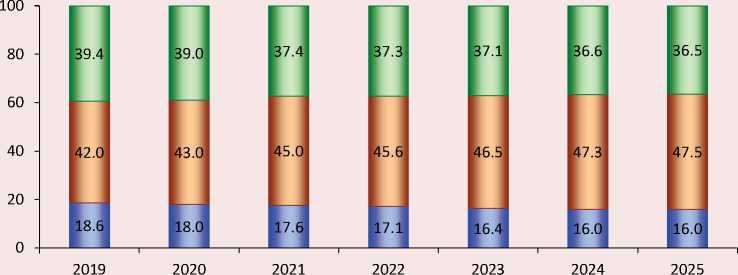
□ ELS = 1 □ 0 < ELS < 1 о ELS = 0
Source: own compilations.
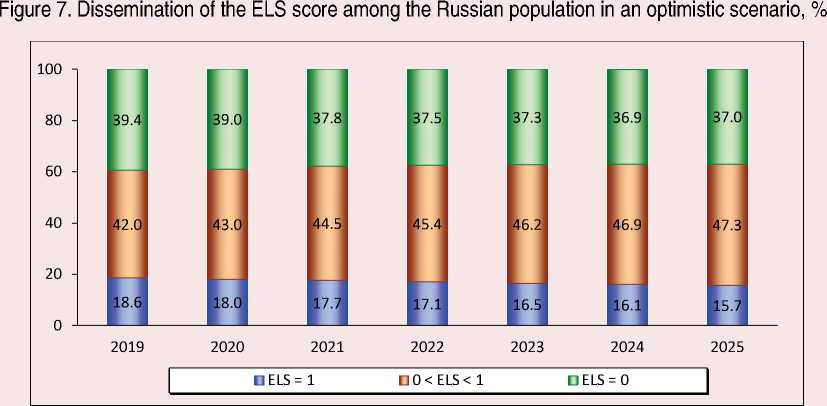
Source: own compilations.
of dissatisfied with ELS = 0 decreases and the proportion of relatively satisfied with ELS increases in the range from 0 to 1.
The share of satisfied in the optimistic scenario generally exceeds the indicators of the pessimistic scenario, except the previous simulation year corresponding to 2025, where it becomes 0.3% lower. This result is explained by the very principle of making estimates of the standard of living, which involves comparing one’s income with the environment. It is likely that the number of wealthy people has grown after a period of high economic activity in an optimistic scenario, but there were even more people whose income has not changed, and the comparative assessment with the environment has fallen.
Figure 8. Dissemination of variants of social responsibility standard in a pessimistic scenario, %
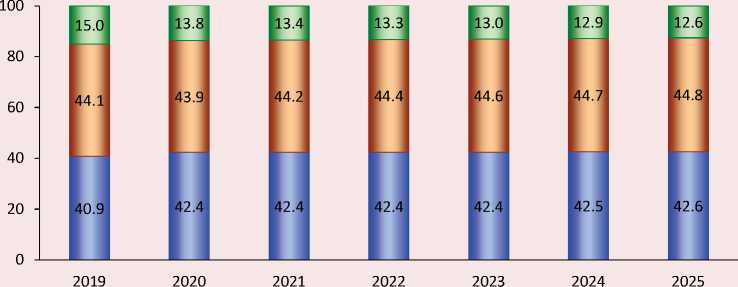
□ Option 1. Individual responsibility о Option 2. Something in between п Option3. Government responsibility
Source: own compilations.
Figure 8 demonstrates changes in the dissemination of the norm of social responsibility in the pessimistic scenario. In comparison with 15% of supporters of individual responsibility for personal well-being in 2019, in 2020 there is a decrease in their share to 13.8%, due to pandemic restrictions affecting, among other things, business representatives. Under the pessimistic scenario, the proportion of supporters of individual responsibility gradually decreases to 12.6%, and the share of supporters of state responsibility increases to 42.6%, compared to 40.9% at the beginning of the simulation. In the optimistic scenario, a similar picture is observed with a slightly smoother decrease in the share of supporters of individual responsibility to 12.8%.
Figure 9 presents changes in the dissemination of the assessment of the work of the political system in the optimistic scenario. At the time of the beginning of the simulation, the share of those satisfied with the work of the political system was 16.8%, which is comparable to the share of dissatisfied (17.9%) at the same time.
Both in the optimistic and pessimistic scenarios, these indicators are moving in opposite directions: a drop in the share of those satisfied with the government to 14% in the optimistic scenario (13.7% in the pessimistic scenario) and an increase in the share of dissatisfied to 27.7% (27.9% in the pessimistic scenario). The largest increase in the number of dissatisfied people was in 2020.
The results confirm the assumption that economic factors influence the dynamics of norms and values in society. Both in the pessimistic and optimistic scenarios, the same involvement of agents in social media and the frequency of their communication with each other remained; only population’s incomes and the corresponding estimates of the standard of living changed. At the same time, the resulting dissemination of norms and values in society has differences: in the pessimistic scenario, the proportion of supporters of individual responsibility and those satisfied with the actions of the authorities is smaller, although the difference with the optimistic option is relatively small (from 0.2 to 0.5%).
Figure 9. Dissemination of assessments of the work of the political system in an optimistic scenario, %
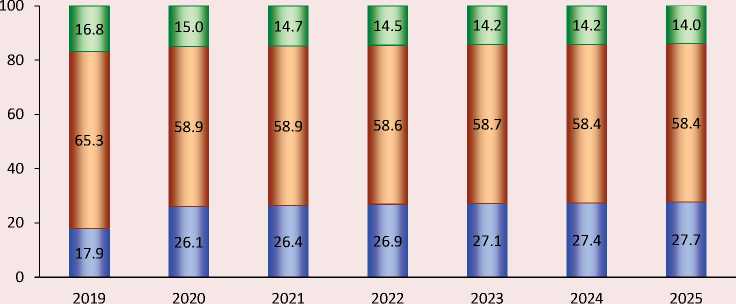
□ Option 1. Completely dissatisfied о Option 2. Something in between □ Option 3. Rather satisfied
Source: own compilations.
Our research is based on a number of assumptions and limitations:
– the article considers a limited set of values, related to the ideas of a fair economic structure of society and the assessment of how the current government corresponds to these ideas;
– we assume that these values are not permanent for a person, but change over time, and not only the person’s financial situation plays a significant role in these changes, but also the comparison with the income and standard of living of their environment;
– the forecast of the dissemination of norms and values in the work is based on a medium-term period of 5 years, due to the uncertainty of the epidemiological situation in the world and the risks it creates for the economies of various countries;
– when assessing social responsibility standard (government/individual responsibility), the agents’ employment sphere is not taken into account, whereas during the period of severe pandemic restrictions, people employed or owning businesses in the affected industries counted most on financial support from the state: tourism, catering, entertainment and personal services;
– changing a person’s beliefs in the presented model is limited to their inner world and is not implemented in attempts to change their life or society.
Conclusion
The aim of the work is to assess the impact of two groups of factors on the dissemination of norms in Russia: on the one hand, social media through popular influencers, on the other – changes in income and standard of living. The former task is directly related to the analysis of the content of social media, their impact on individuals, social groups and society as a whole. The latter task relates to the field of traditional economic forecasting. The integration of these different directions becomes possible through the use of an agent-oriented approach, where an agent is both a carrier and a distributor of a certain set of values, a member of social structures (family, team of colleagues and fellow students) and an economic agent, employed in a certain industry and having a certain income. The dissemination of such integrated models, using up-to-date data on the population and economy, can serve as a new step toward the informatization of management processes and socio-political research. The research results can be divided into four main groups.
-
1. The implementation of the concept of a social agent, which includes the principles of dividing agents into social activity clusters, a way to represent the agent’s norms and values in the form of a set of options with varying frequency and the function of constructing subjective assessments of the standard of living, based on the agent’s comparison with its environment.
-
2. Presentation of various aspects of creating an agent-based model of the dynamics of the dissemination of norms and values including the model structure, its integration with the artificial society model reflecting the population and Russia’s economy, algorithms for creating a network of connections between agents and the dynamics of norms depending on current estimates of standard of living.
-
3. Analysis of empirical data on the dissemination of norms and values in Russia, in particular, the results of the seventh wave of the World Values Survey toward the relationship of income level, assessment of the work of the political system and social responsibility standards. The analysis has shown a significant degree of correlation between residents’ incomes, political assessments and norms, which was taken into account when developing the model algorithms.
-
4. Scenario calculations, based on the developed model, aimed at forecasting the likely dynamics of public sentiment in various economic conditions.
The results obtained indicate a rather serious relationship between the economic situation and the residents’ satisfaction with the government’s actions. In both scenarios considered, the share of supporters of individual responsibility for providing all the necessary and satisfied with the current government is falling, but in the pessimistic scenario, the drop is more noticeable. Social media also have an impact on the results because even in an optimistic scenario involving the recovery of household incomes to pre-crisis levels, norms and values do not show a return to their original meaning; in other words, the observed dynamics cannot be explained solely by the action of economic factors.
We can choose a number of directions to continue the research. Firstly, the expansion of the list of norms and values studied including the importance of socio-political freedoms and the assessment of their dissemination in society, religious and life values (priority of career or family creation, the desired number of children, attachment to the hometown and country). Secondly, the study of the impact of restrictions on the digital media content on the dissemination of norms and values among various social categories, as well as possible side effects, when the restriction of content and the prohibition of the activities of individual influencers only increases discontent with the authorities, especially among young people. Thirdly, it is simulation of the relationship between internal beliefs and actions in society: voting in elections, organizing and participating in demonstrations and protest acts, and emigration to other countries. The list of scenario parameters of the economic environment also needs to be expanded, in particular taking into account possible deviations of inflation from the target values of the Bank of Russia and adjusting the household savings rate as a reaction to changes in the social policy of the state.
Список литературы Forecasting the dissemination of norms and values in Russia with the use of an agent-based approach
- Adams J., White G., Araujo R. (2021). The role of mistrust in the modelling of opinion adoption. Journal of Artificial Societies and Social Simulation, 24(4), 4. Available at: http://jasss.soc.surrey.ac.uk/24/4/4.html. DOI: 10.18564/jasss.4624
- Atkinson K., Bench-Capon T. (2016). Value based reasoning and the actions of others. Frontiers in Artificial Intelligence and Applications, 285, 680–688. DOI: 10.3233/978-1-61499-672-9-680
- Ceragioli F., Frasca P. (2018). Consensus and disagreement: The role of quantized behaviors in opinion dynamics. SIAM Journal on Control and Optimization, 56, 1058–1080. DOI: 10.1137/16M1083402
- Chen Z., Lan H. (2021). Dynamics of public opinion: Diverse media and audiences’ choices. Journal of Artificial Societies and Social Simulation, 24(2), 8, Available at: http://jasss.soc.surrey.ac.uk/24/2/8.html. DOI: 10.18564/jasss.4552
- Cranefield S., Winikoff M., Dignum V., Dignum F. (2017). No pizza for you: Value-based plan selection in BDI agents. In: Proceedings of the Twenty-Sixth International Joint Conference on Artificial Intelligence Main Track. DOI: 10.24963/ijcai.2017/26
- Davydov S.G. (2021). Digital compitencies of Russians and work on self-isolation during the COVID-19 pandemic. Monitoring obshchestvennogo mneniya: ekonomicheskie i sotsial'nye peremeny=Monitoring of Public Opinion: Economic and Social Changes, 2, 403–422. DOI: 10.14515/monitoring.2021.2.1913 (in Russian).
- Deffuant G., Neau D., Amblard F., Weisbuch G. (2000). Mixing beliefs among interacting agents. Advances in Complex Systems, 3, 87–98.
- Dong Y., Ding Z., Chiclana F., Herrera-Viedma E. (2021). Dynamics of public opinions in an online and offline social network. IEEE Transactions on Big Data, 7(4), 610–618. DOI: 10.1109/TBDATA.2017.2676810
- Fishbein M., Azjen I. (2011). Predicting and Changing Behavior: The Reasoned Action Approach. New York: Psychology Press.
- Hegselmann R., Krause U. (2002). Opinion dynamics and bounded confidence models, analysis, and simulation. Journal of Artificial Societies and Social Simulation, 5(3).
- Hu H., Zhu J.J. (2017). Social networks, mass media and public opinions. Journal of Economic Interaction and Coordination, 12(2), 393–411. DOI: 10.1007/s11403-015-0170-8
- Iliycheva L.E., Kondrashov A.O., Lapin A.V. (2021). Trust as a bridge over the uncertainty gap between the government and society. Monitoring obshchestvennogo mneniya: ekonomicheskie i sotsial'nye peremeny=Monitoring of Public Opinion: Economic and Social Changes, 2, 162–185. DOI: 10.14515/monitoring.2021.2.1917 (in Russian).
- Jiao Y., Li Y. (2021). An active opinion dynamics model: The gap between the voting result and group opinion. Information Fusion, 65, 128–146. DOI: 10.1016/j.inffus.2020.08.009
- Lapin N.I. (2010). Functional-oriented clusters of basic values of the population of Russia and its regions. Sotsiologicheskie issledovaniya=Sociological Studies, 1, 28–36 (in Russian).
- Makarov V.L., Bakhtizin A.R. (2013). Sotsial’noe modelirovanie – novyi komp’yuternyi proryv (agent-orientirovannye modeli) [Social Modeling – a New Computer Breakthrough (Agent-Oriented Models)]. Moscow: Ekonomika.
- Mareeva S.V. (2013). Dynamics of norms and values of Russians. Sotsiologicheskie issledovaniya=Sociological Studies, 7, 120–130 (in Russian).
- Mareeva S.V. (2015). Values in modern Russian society. Monitoring obshchestvennogo mneniya: ekonomicheskie i sotsial’nye peremeny=Monitoring of Public Opinion: Economic and Social Changes, 4, 50–65 (in Russian).
- Martins A.C.R. (2013). Trust in the CODA model: Opinion dynamics and the reliability of other agents. Physics Letters A, 377(37), 2333–2339. DOI: 10.1016/j.physleta.2013.07.007
- Mashkova A.L., Dembovskii I.A. Novikova E.V. (2019). Formation of the consumer strategy of households in the agent model of sectoral development of the Russian economy. Iskusstvennye obshchestva=Artificial Societies, 14(3) (in Russian).
- Mashkova A.L., Nevolin I.V., Savina O.A. et al. (2020). Generating social environment for agent-based models of computational economy. In: Chugunov A., Khodachek I., Misnikov Y., Trutnev D. (Eds). Electronic Governance and Open Society: Challenges in Eurasia. EGOSE 2020, 1349, 291–305. DOI: 10.1007/978-3-030-67238-6_21
- Mashkova A.L., Novikova E.V., Savina O.A. et al. (2020). Simulating budget system in the agent model of the Russian Federation spatial development. In: Chugunov A., Khodachek I., Misnikov Y., Trutnev D. (Eds). Electronic Governance and Open Society: Challenges in Eurasia. EGOSE 2019, 1135, 17–31. DOI: 10.1007/978-3-030-39296-3_2
- Mercuur R., Dignum V., Jonker C. (2019). The value of values and norms in social simulation. Journal of Artificial Societies and Social Simulation, 22(1), 9, Available at: http://jasss.soc.surrey.ac.uk/22/1/9.html. DOI: 10.18564/jasss.3929
- Novikova T.S., Tsyplakov A.A. (2020). Social policy in a multi-regional agent-based model. Ekonomicheskie i sotsial’nye peremeny: fakty, tendentsii, prognoz=Economic and Social Changes: Facts, Trends, Forecast, 13(3), 129–142. DOI: 10.15838/esc.2020.3.69.9 (in Russian).
- Pineda M., Buendía G. (2015). Mass media and heterogeneous bounds of confidence in continuous opinion dynamics. Physica A: Statistical Mechanics and Its Applications, 420, 73–84. DOI: 10.1016/j.physa.2014.10.089
- Poel I.V., Royakkers L.M. (2011). Ethics, Technology, and Engineering: An Introduction. Hoboken, NJ: John Wiley & Sons.
- Quattrociocchi W., Conte R., Lodi E. (2011). Opinions manipulation: Media, power and gossip. Advances in Complex Systems, 14(04), 567–586. DOI: 10.1142/S0219525911003165
- Rogers E.M. (2003). Diffusion of Innovations, 5th Edition. New York, NY: Free Press.
- Stauffer D. (2002). Sociophysics: The Sznajd model and its applications. Computer Physics Communications, 46(1), 93–98.
- Suslov V.I., Domozhirov D.A., Ibragimov N.M. et al. (2016). Agent-based multiregional input-output model of the Russian economy. Ekonomika i matematicheskie metody=Economics and Mathematical Methods, 52(1), 112–131 (in Russian).
- Sznajd-Weron K., Sznajd J. (2000). Opinion evolution in closed community. International Journal of Modern Physics C, 11(6), 1157–1165.
- Waigeng Y., Morev M.V., Ukhanova Yu.V., Kosygina K.E. (2021). The effectiveness of the authorities’ activities at the local level in the COVID-19 pandemic (the experience of Russia and China). Ekonomicheskie i sotsial’nye peremeny: fakty, tendentsii, prognoz=Economic and Social Changes: Facts, Trends, Forecast, 14(4), 231–250. DOI: 10.15838/esc.2021.4.76.14 (in Russian).
- Weisbuch G., Deffuant G., Amblard F., Nadal J.-P. (2002). Meet, discuss, and segregate! Complexity, 7(3), 55–63. DOI:10.1002/cplx.10031
- Zhang A., Zheng M., Pang B. (2018). Structural diversity effect on hashtag adoption in Twitter. Physica A: Statistical Mechanics and Its Applications, 493, 267–275. DOI: 10.1016/j.physa.2017.09.075
- Zino L., Ye M., Cao M. (2020). A two-layer model for coevolving opinion dynamics and collective decision-making in complex social systems. Chaos: An Interdisciplinary Journal of Nonlinear Science, 30(8), 083107. DOI: 30.083107.10.1063/5.0004787

